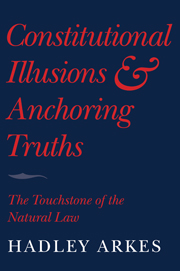Book contents
- Frontmatter
- Contents
- Acknowledgments
- INTRODUCTION: The Anchoring Common Sense and the Puzzles of the Law
- ONE On the Novelties of an Old Constitution: Settled Principles and Unsettling Surprises
- TWO The Natural Law – Again, Ever
- THREE Lochner and the Cast of Our Law
- FOUR The Strange Case of Prior Restraint: The Pentagon Papers
- FIVE Near Revisited
- SIX The Saga of Frank Snepp and the New Regime of Previous Restraints
- SEVEN And Yet…A Good Word on Behalf of the Legal Positivists
- EIGHT Conclusion and Afterword
- Index
- References
FOUR - The Strange Case of Prior Restraint: The Pentagon Papers
Published online by Cambridge University Press: 05 June 2012
- Frontmatter
- Contents
- Acknowledgments
- INTRODUCTION: The Anchoring Common Sense and the Puzzles of the Law
- ONE On the Novelties of an Old Constitution: Settled Principles and Unsettling Surprises
- TWO The Natural Law – Again, Ever
- THREE Lochner and the Cast of Our Law
- FOUR The Strange Case of Prior Restraint: The Pentagon Papers
- FIVE Near Revisited
- SIX The Saga of Frank Snepp and the New Regime of Previous Restraints
- SEVEN And Yet…A Good Word on Behalf of the Legal Positivists
- EIGHT Conclusion and Afterword
- Index
- References
Summary
The scene: Washington, D.C., in the mid-1980s, a meeting of a panel of the National Endowment for the Humanities. Four professors were sitting with members of the professional staff, reviewing proposals for grants. One proposal, bristling with promise, or at least with pretension, offered a plan for a documentary series on television, dealing with the issue of “prior restraints.” Within the space of two broadcasts, the program would move from the landmark case of Near v. Minnesota in 1931, to the famous case of the Pentagon Papers in 1971. Each story would have, for the screen, rather colorful characters, with sides dark enough to cast deep shadows and textures. With Near v. Minnesota, there was the story of the Saturday Press, something down dirtier and lower than what we could call the scandal sheets in our own day, “journals” (if one could call them that) like the National Enquirer, sold in supermarkets. Like the sensational tabloids of our own day, the Saturday Press trafficked in scandals. But unlike the tabloids sold today in supermarkets, the newspaper in Minneapolis had blackmail as a much more deliberate part of its rationale, or its plan of business. Without taking sides too quickly, we may say that the owners of this newspaper were counting on more than advertising and sales to make their money in publishing.
- Type
- Chapter
- Information
- Constitutional Illusions and Anchoring TruthsThe Touchstone of the Natural Law, pp. 108 - 149Publisher: Cambridge University PressPrint publication year: 2010



